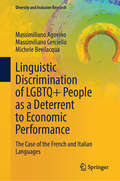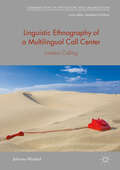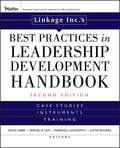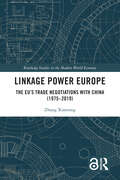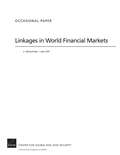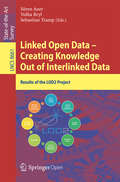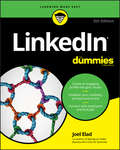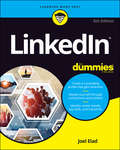- Table View
- List View
Linguaggio Del Corpo: Come Leggere Immediatamente Il Linguaggio Del Corpo A Prima Vista
by Steven NavarroAnalizzare le persone ti darà un discreto vantaggio in situazioni personali, sociali e professionali. Anche se la maggior parte di noi analizza le altre persone in maniera subconscia, non ci sono molti che prendono il controllo di questa abilità e la perfezionano, quindi farlo ti darà dei benefici che altri si perdono. Puoi conoscere queste cose. In questo libro, imparerai come categorizzare le persone nei tipi di personalità appena le incontri. Imparerai come leggere le persone quando stai vendendo loro qualcosa. Comprenderai meglio come capire cosa sta pensando una donna quando ti guarda. Saprai anche riconoscere quando quel giocatore di poker seduto di fronte a te sta bluffando e se un testimone durante un processo sta mentendo durante la sua testimonianza. Cosa stai aspettando? Non attendere oltre! Scorri la pagina verso l’alto e clicca ora il pulsante “compra” per iniziare il viaggio nella vita dei tuoi sogni!
Linguaggio Del Corpo: Guida Per Diventare Una Persona Di Successo ( Body Language)
by Brian LevinePrima di un meeting di lavoro o di un appuntamento importante trascorriamo ore a prepararci. Indossiamo il vestito migliore, cerchiamo le parole giuste da dire; eppure, a volte, l'esito di questi incontri non è quello che speravamo. Perché? La risposta è semplice: non abbiamo utilizzato un linguaggio del corpo da vincenti. Per diventare una persona di successo, devi apparire come tale. Questo testo ti insegnerà a mostrarti sicuro di te, in modo che chiunque ti guardi si renda immediatamente conto di quanto alto sia il tuo potenziale.
Linguaggio Del Corpo: Linguaggio Del Corpo
by Ryan CuddyNon siamo soliti notare l’esistenza dell’ombra del corpo umano. Non abbiamo la più pallida idea di cosa le accade quando andiamo a dormire. Eppure ovunque siamo, qualunque cosa facciamo, la nostra ombra ci seguirà e farà altrettanto. Quando parliamo diciamo in realtà molto poco, perché è il nostro corpo a parlare per noi! Gran parte della nostra espressione avviene inconsciamente, tramite il nostro comportamento fisico, la postura, i gesti, i movimenti degli occhi, le espressioni del volto, il tocco e persino l’uso dello spazio. Non attendere oltre e scopri subito la CHIAVE per una vita nuova e migliore!
Linguistic Discrimination of LGBTQ+ People as a Deterrent to Economic Performance: The Case of the French and Italian Languages (Diversity and Inclusion Research)
by Massimiliano Agovino Massimiliano Cerciello Michele BevilacquaThis book explores the adverse economic effects of discriminatory language against LGBTQ+ people. The case studies under investigation are represented by the French and the Italian language, both boasting vast arrays of slurs employed to denote negatively the members of the LGBTQ+ community. Looking at the relative frequencies of slurs over time, the analysis proposed measures the extent of linguistic discrimination. Subsequently, the book identifies the negative impact of discrimination on economic performance in France and Italy in the long run. Slurs impose a psychological cost on the members of the LGBTQ+ community, who become as a result less productive in the workplace. Ultimately, slurs affect overall economic performance and reduce economic growth at the national level. This book stresses the role of inefficiencies associated with discrimination against LGBTQ+ individuals in various spheres of life, with a particular focus on their economic consequences. Discriminatory language thus emerges not only as a negative phenomenon per se, but also as an obstacle to economic growth. This work draws elements from different disciplines and the results it obtains may prove appealing to scholars of economics, linguistics and gender studies, as well as to policymakers seeking to overcome social exclusion while stimulating economic performance.
Linguistic Ethnography of a Multilingual Call Center: London Calling (Communicating In Professions And Organizations Ser.)
by Johanna WoydackThis book presents an innovative institutional transpositional ethnography that examines the textual trajectory of “the life of a calling script” from production by corporate management and clients to recontextualization by middle management and finally to application by agents in phone interactions. Drawing on an extensive original research it provides a behind-the-scenes view of a multilingual call center in London and critiques the archetypal modern workplace practices including extensive use of monitoring and standardization and use of low-skilled precariat labor. In doing so, it offers fresh perspectives on contemporary debates about resistance, agency, and compliance in globalized workplaces. This study will provide a valuable resource to students and scholars of management studies, communication, sociolinguistics, and linguistic anthropology.
Link Manufacturing Process and Product Life Cycles
by Steven C. Wheelwright Robert H. HayesFocusing on the manufacturing process gives a new dimension to strategy. The "process life cycle," related but distinct from the product life cycle, facilitates the understanding of strategic options available. Most companies occupy a particular region on a natural, diagonal matrix of the stages of the product life cycle and the choices of production process for that product. A company may seek competitive advantage off the diagonal, but should understand the implications of each move.
Link Out
by Leslie GrossmanProven networking strategies to achieve lifetime professional successIn today's competitive market, the typical ways of communicating don't serve the purpose of building strong, long-term connections. We need to build collaborative relationships that are memorable and influence others to aid in achieving our goals. What is the first step to connecting with the right person? It's not simply passing along a business card or rattling on about yourself, it is listening to what to the other person has to say. Link Out is filled with strategies that can turn strangers into connections that can change your career or business. Explains how to ensure that potential entourage members perceive you positivelyOffers a tracking process, which enables accountabilityTeaches how to express visions and goals through your personal brandHelps you to transform brief connections into relationships that produce valuable introductions and referrals Link Out delivers an entourage of people willing and eager to make introductions, connections, and referrals--propelling one's resume or business to the top of the heap.
Link REIT
by Siddharth Yog Keith Chi-ho WongPublicly listed in November 2005, Link REIT was the first real estate investment trust (REIT) in Hong Kong after the Hong Kong government decided to privatize a portfolio of community shopping malls, car parks, and fresh produce markets. Run by CEO, George Hongchoy, the company had evolved from managing retail spaces in public housing estates in Hong Kong into new property types such as offices, and into new geographies such as Beijing and Shanghai in Mainland China. The case centers around the many questions Hongchoy faced on whether the strategic shift would dilute Link's mission of servicing the local community with affordable yet quality retail experience, while balancing his responsibilties to his shareholders while pursuing other growth opportunities.
Link REIT
by Siddharth YogPublicly listed in November 2005, Link REIT was the first real estate investment trust (REIT) in Hong Kong after the Hong Kong government decided to privatize a portfolio of community shopping malls, car parks, and fresh produce markets. Run by CEO, George Hongchoy, the company had evolved from managing retail spaces in public housing estates in Hong Kong into new property types such as offices, and into new geographies such as Beijing and Shanghai in Mainland China. The case centers around the many questions Hongchoy faced on whether the strategic shift would dilute Link's mission of servicing the local community with affordable yet quality retail experience, while balancing his responsibilties to his shareholders while pursuing other growth opportunities.
Link Strategic Capabilities to Workforce Strategy: Differentiating Your Workforce Strategy
by Richard W. Beatty Brian E. Becker Mark A. HuselidWorkforce or talent strategies don't matter strategically in their own right. They matter only when they make a difference in strategy execution. This chapter provides the business case for the importance of linking workforce strategy to strategic capabilities. It also describes several approaches to determining the strategic capabilities in your organization and shows how the structure of a differentiated workforce strategy follows from a focus on capabilities. This chapter was originally published as chapter 2 of "The Differentiated Workforce: Transforming Talent into Strategic Impact."
Link Technology to Your Long-Term Business Goals: How to Use Technology to Mobilize Your People, Strategy and Operations
by PrazLink the use of technology with long-term business goals to optimize the core elements in your organization: people, strategy, and operations. This book will show you how effective planning of processes and execution of strategies with the help of technology can bring about an organization-wide increase in productivity and performance.Business environments have grown increasingly competitive. Before an organization realizes what has happened, it can lose or gain market share. Being agile is the key to success. This book covers the processes that can help your enterprise be agile and follow best practices when executing your business strategy.You'll review case studies from real-world experiences that dive deep into the problems a business encounters and the ways to solve those challenges. They deal with the different ways in which your organization can achieve dramatic performance improvements by changing your company’s processes. The book also explains how objectives and key results can be used to align business teams for increased productivity. With Use Tech to Mobilize Your People, Strategy, and Operations you'll learn how the intensity of core processes can ensure that growth does not wane in your organization. What You'll Learn Know the role of three core elements in organizations: people, strategy, operationsUnderstand how technology can enhance these three core elementsBe aware of the importance of scale and security in the information eraEliminate distractions and uncertainty in core processesWho This Book Is ForPeople with experience building businesses (founders, CEOs, COOs, CTOs, project managers, product managers, operation heads, sales heads, finance heads, strategy heads, technology leaders) who are looking for technology solutions to business problems
Linkage Inc's Best Practices in Leadership Development Handbook
by Marshall Goldsmith Linkage Inc. Justin Bourke Samuel M. Lam David GiberLeadership development is a planned effort that enhances the learner's capacity to lead people. Building on the success of the first edition, Linkage conducted a study of over 300 top organizations and their needs in organizational change and leadership development that identifies approaches to leadership development that have proven to be successful. The work offers practical "how-to" instructions developing leaders and engaging in leadership development. It provides current in-depth models, assessments, tools, and other instruments that can be used for immediate application within a variety of organizations.
Linkage Power Europe: The EU’s Trade Negotiations with China (1975-2019) (Routledge Studies in the Modern World Economy)
by Zhang XiaotongThis book looks at the history of the EU’s trade negotiations with China from 1975 to 2019 from a distinctive perspective – the EU as a linkage power. The author explains how the EU through linkage strategies speaks with one voice, overcomes its weakness in military capabilities and translates its non-military capabilities into advantages and influences in some specific policy areas. The book systematically traces the European negotiators’ tactics in managing the EU’s trade relations with China. It’s the first time that the history of EU–China trade negotiations is presented to the public by a seasoned trade negotiator. The author, combining the identities of a negotiator and a scholar, gives a panoramic view of EU–China trade relations from 1975, when the European Economic Community established diplomatic relations with China, to 2019 when the Juncker Commission leaves office. This book will appeal to policymakers, think-tankers, professors and students, as well as anyone who is interested in trade policies and negotiations in the EU and China.
Linkages in World Financial Markets
by C. Richard Neu Jack CliftThis paper asks whether there has been any diminution in the traditional role of U.S. financial markets in leading movements in other financial markets. It examines daily movements in three major equity indexes, how daily changes in one market are correlated with immediately subsequent changes in the other two, and the size of movements in each market after a given change in the other markets before and after the onset of the crisis.
Linked Decisions: How to Plan Ahead by Effectively Coordinating Current and Future Decisions
by John S. Hammond Ralph L. Keeney Howard RaiffaMany important decisions require you to select now among alternatives that will greatly influence your decisions in the future. This chapter addresses an important element of effective decision making, illustrating how to deal more effectively with decisions that are linked over time.
Linked Labour Histories: New England, Colombia, and the Making of a Global Working Class
by Aviva ChomskyExploring globalization from a labor history perspective, Aviva Chomsky provides historically grounded analyses of migration, labor-management collaboration, and the mobility of capital. She illuminates the dynamics of these movements through case studies set mostly in New England and Colombia. Taken together, the case studies offer an intricate portrait of two regions, their industries and workers, and the myriad links between them over the long twentieth century, as well as a new way to conceptualize globalization as a long-term process. Chomsky examines labor and management at two early-twentieth-century Massachusetts factories: one that transformed the global textile industry by exporting looms around the world, and another that was the site of a model program of labor-management collaboration in the 1920s. She follows the path of the textile industry from New England, first to the U. S. South, and then to Puerto Rico, Japan, Mexico, Central America, the Caribbean, and Colombia. She considers how towns in Rhode Island and Massachusetts began to import Colombian workers as they struggled to keep their remaining textile factories going. Most of the workers eventually landed in service jobs: cleaning houses, caring for elders, washing dishes. Focusing on Colombia between the 1960s and the present, Chomsky looks at the Urab banana export region, where violence against organized labor has been particularly acute, and, through a discussion of the AFL-CIO's activities in Colombia, she explores the thorny question of U. S. union involvement in foreign policy. In the 1980s, two U. S. coal mining companies began to shift their operations to Colombia, where they opened two of the largest open-pit coal mines in the world. Chomsky assesses how different groups, especially labor unions in both countries, were affected. Linked Labor Histories suggests that economic integration among regions often exacerbates regional inequalities rather than ameliorating them.
Linked Open Data -- Creating Knowledge Out of Interlinked Data
by Sören Auer Volha Bryl Sebastian TrampLinked Open Data (LOD) is a pragmatic approach for realizing the Semantic Web vision of making the Web a global, distributed, semantics-based information system. This book presents an overview on the results of the research project "LOD2 -- Creating Knowledge out of Interlinked Data". LOD2 is a large-scale integrating project co-funded by the European Commission within the FP7 Information and Communication Technologies Work Program. Commencing in September 2010, this 4-year project comprised leading Linked Open Data research groups, companies, and service providers from across 11 European countries and South Korea. The aim of this project was to advance the state-of-the-art in research and development in four key areas relevant for Linked Data, namely 1. RDF data management; 2. the extraction, creation, and enrichment of structured RDF data; 3. the interlinking and fusion of Linked Data from different sources and 4. the authoring, exploration and visualization of Linked Data.
Linked: Conquer LinkedIn. Get Your Dream Job. Own Your Future.
by Omar Garriott Jeremy SchifelingThe LinkedIn insider&’s guide to how the new job search really works—and how to make it work for you. No one disputes that LinkedIn is the world&’s biggest job market. So it&’s about time that someone with the inside scoop explained how to make the most of it. Here, from two LinkedIn experts and former employees, is the definitive guide that demystifies the massive site and gives every reader—from the newly minted college graduate to the midlife career-changer—the most important strategies to win the modern job search game. Clear, lively, and decidedly practical, Linked shows how to burnish your personal brand so recruiters come to you. Tap the power of the network effect and turn anyone into an invaluable referral. Think like employers and focus your profile to get noticed, get considered, and get hired. And game both the search algorithm and Applicant Tracking Systems used by nearly every employer in every economic sector. The result: not just a great job, but the future of your dreams.
LinkedIn (A)
by Mikolaj Jan PiskorskiIn the summer of 2005, LinkedIn, a two-year-old start-up, was choosing between two options to monetize its 5 million business people network. Members could contact each other through trusted intermediaries on the network to offer or seek jobs, consulting engagements, expertise, and financing. The company had outpaced its competitors by building the most populous online business network, but it had little revenue to show its investors. The first revenue option entailed keeping the existing features unchanged and rolling out a bundle of eight new services for a monthly fee of $15. These services would be targeted at network members who had forged many connections, logged in frequently, and viewed the profiles of many other members. The second proposal involved changing a basic design feature of LinkedIn by allowing members to contact each other without intermediaries for a fee. Fewer members would avail themselves of this feature, but those who did would be willing to pay as much as $5-$15 per message. This option ran a substantial risk of alienating members and would prompt some to abandon LinkedIn.
LinkedIn Corp., 2008
by David B. Yoffie Michael Slind Nitzan AchsafIn June 2008, the online professional networking service LinkedIn became a $1 billion company. But CEO Dan Nye understood that LinkedIn faced several strategic dilemmas. Founded in 2002, LinkedIn by 2008 had become the world's leading professional networking service (PNS), with more than 23 million members. Aiming to "dominate the business of business networking," in Nye's words, LinkedIn allowed individual members to post a profile on the LinkedIn site and then to use the site's tools to search for job opportunities; to recruit job candidates; to find suppliers, partners, and customers; and to seek out expert advice. The company was also expanding into corporate services that would enable companies to build and manage their own online networks. With revenue sources that included advertising, premium subscriptions, job posting services, and business solutions, LinkedIn was on track to bring in revenues in 2008 of up to $100 million. A new funding round in mid-2008 yielded a $1 billion valuation for the company. Three key dilemmas confronted LinkedIn, however. First, at a time when the "walled garden" model of online community building was under siege, it had to decide how far it should open its platform to users. Second, in light of competition from highly popular social network services such as Facebook and MySpace, LinkedIn had to decide whether to incorporate social networking into its value proposition. Third, in an increasingly global business environment, it had to weigh the option of merging with its leading international competitor, XING.com.
LinkedIn Corporation
by James Weber Francois BrochetThe purpose of this case is to help students critically evaluate the market value of LinkedIn's stock following its recent IPO. In the context of strong investor appetite for social media companies, LinkedIn is the lamp bearer among U.S. companies in that industry that are considering tapping into public markets. The case can serve to illustrate the challenges of valuing an early-stage high-growth company with a great deal of uncertainty about fundamental value and how quoted prices might reflect expectations that are hard to justify. Regardless of which valuation method is employed (e.g., residual income, discounted cash flow, multiples), the case provides a platform (i) to map the firm's key success and risk factors into forecasts and estimates for its future performance and cost of capital, and (ii) to critically assess the implied assumptions underlying the market's expectations. The case is best suited for a course on business valuation at all levels (undergraduate, MBA, executive programs).
LinkedIn Corporation, 2012
by David B. Yoffie Liz KindSince its inception in 2003, LinkedIn had become a leading Silicon Valley institution with a brand name that was recognizable throughout the U.S. and in many countries overseas. As of March 2012, LinkedIn was the world's largest professional network on the Internet with $522.2 million in revenue in 2011 and more than 150 million members in over 200 countries. Unlike other major social networking sites, LinkedIn focused exclusively on fostering connections within the professional market. As LinkedIn's CEO thought about the future, he recognized the challenges in continuing to massively scale the company. At the same time, he focused on how LinkedIn could continue to use its vast amount of data to provide additional products and services for its members and customers.
LinkedIn For Dummies
by Joel EladMake LinkedIn your number one professional branding tool LinkedIn is the premiere social network for professionals looking to discover new opportunities, enhance personal branding, connect with other professionals, and make career advancements. With LinkedIn For Dummies, you’ll have step-by-step instructions on how to take advantage of the latest tools and features to do all of this and more. This book will teach you how to create an attractive profile that employers will notice, as well as ways to expand your network by making connections around the globe. You'll also learn how to best navigate the new user interface, write recommendations, take a course with LinkedIn Learning, and conduct your job search. Create an appealing, detailed profile Establish your credibility and personal brand Connect with employers and find jobs Request and write recommendations Whether you’re one of LinkedIn’s 500 million global members or brand new to the site, this authoritative resource helps you get the most out of the world’s largest professional network.
LinkedIn For Dummies
by Joel EladBrand yourself like a pro on LinkedIn LinkedIn multiplies what you know by the power of who you know to deliver the number one social platform for business professionals and new job seekers. LinkedIn For Dummies shows LinkedIn newcomers the best ways to discover new opportunities, enhance their personal brand, network with other professionals, and give an exponential boost to their career. Consider this book a passport to help you connect more successfully with many of LinkedIn’s 660+ million members in over 200 countries, as well as an expert guide to the platform’s tools and features and the proven tactics that get you noticed. In this friendly, all-access introduction to the LinkedIn scene, entrepreneurship guru Joel Elad clues you in on the essentials. Get the latest insight on how to create an attractive profile that will make employers give you a second glance as well as techniques for making useful connections across the globe. In no time at all you’ll also be right at home with the profile user interface and getting busy with adding content, searching for career opportunities, and, if you’re looking to hire for your company, recruiting top candidates. Build your personal brand and market it Sell yourself by highlighting skills, awards, and endorsements Get connected with LinkedIn groups Manage and make introductions via InMail Relationships matter: LinkedIn For Dummies gives you the online social skills to turn six degrees of separation into the colleagues, mentors, and friends who will transform your career—and your life.



